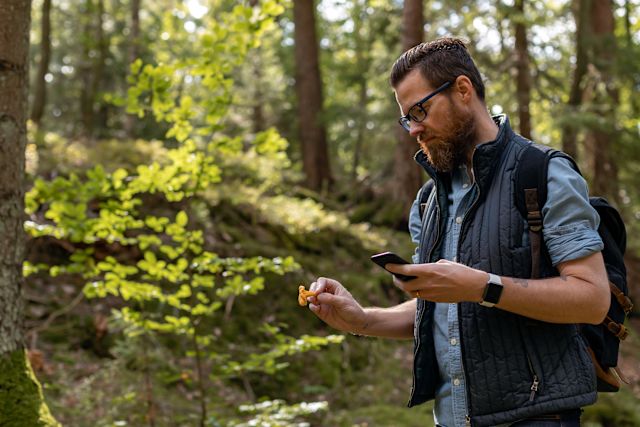Updated on October 3, 2025.
When you hear “hunter-gatherer,” you might imagine a nomadic person roaming ancient plains in search of food. In fact, a small number of hunter-gatherer societies exist today in parts of the world including Bolivia, Peru, Canada, and Tanzania. These cultures comprise 5 to 10 million people.
Much like their forebears, contemporary hunter-gatherers live off the land, foraging for food, hunting, fishing, and building shelter from their surroundings. Though many are nomadic and live in small communities, there are significant differences between ancient hunter-gather communities and today’s hunter-gather communities. For example, many contemporary populations have access to technologies like guns, GPS, and trade with agricultural societies.
People in hunter-gatherer communities have relatively high rates of childhood death and are at elevated risk of certain infections, gastrointestinal diseases, and traumatic accidents. But what these populations are not dying from can offer some guidelines toward a healthier lifestyle.
Reduced disease risk
A tiny minority of hunter-gatherers experience chronic illnesses like diabetes, heart disease, and cancer. Type 2 diabetes is almost nonexistent in many of these groups. Rates of high blood pressure are significantly lower, as well.
Research suggests this is partly because hunter-gatherers tend to maintain a healthy weight. Few are obese. In the meantime, more than 40 percent of adults in the United States have obesity.
Two additional factors play into this: better fitness and a "cleaner" diet.
Better fitness
The conventional image of the hunter-gatherer lifestyle is one of intense physical labor: running, hunting, toting gear. Research into present-day hunter-gatherer populations bears this out. Many get several hours of physical activity each day, including 5 to 10 miles of walking. But the large amounts of exercise may not translate into an outsized calorie expenditure.
Researchers analyzed hunter-gatherer societies in present-day Bolivia and Peru in a 2021 article published in the Journal of Science in Sport and Exercise. They found that these populations don’t spend all their daylight hours exerting themselves. Instead, they take a more high-low approach, expending a lot of energy on some days while relaxing and performing only moderate- to low-intensity activity, like walking, on others.
Based on their findings, the study authors recommend that an optimal fitness regimen may mimic that lifestyle, with consistent, low-to-moderate activity mixed with higher intensity levels across a range of activities to develop strength, endurance, and flexibility.
A cleaner diet
There are also a few lessons to be learned from hunter-gatherers’ dietary habits. Hunter-gatherers eat extremely locally and tend to consume just what they hunt or forage on foot. They consume seasonal foods, which may mean more meat in the winter and more plants in the summer. Researchers have observed that some eat lean game, others eat fish, and most consume carbohydrates. They tend to have high-fiber diets and eat plenty of wild plants, fruits, and vegetables, meaning they receive loads of antioxidants and vitamins.
What they aren’t eating can be just as insightful. Hunter-gatherers don’t have easy access to processed foods. Their diets also consist of little salt and few refined sugars. In general, calorie consumption is less than in the typical Western diet. So, even though they may be more physically active, some researchers believe their good health may be attributable just as much to diet.
Taking inspiration from the hunter-gatherer lifestyle
For most people, adopting a full-time hunter-gatherer lifestyle is not practical. But there are a few ways that anyone can benefit by emulating certain features. Here are a few tips to get you started:
Exercise for strength
Try to integrate resistance training into your fitness routine. As little as one hour each week of resistance exercise will not only increase your strength but may lower your risk of cardiovascular disease by nearly 30 percent.
Keep it social
Our sedentary lifestyles and reliance on technology dramatically reduce one of the most enjoyable parts of hunter-gatherer physical activity: socializing. To address this, don’t underestimate the “power of play.” In other words, when you exercise, try to do so with friends and family. Doing this can not only reduce isolation—shown to be harmful for health—but can also turn exercise into something you look forward to, instead of a chore.
Get fresh air
Exercising outside on natural surfaces like grass and dirt works more muscles and boosts balance better than pounding the pavement or gym floors. While you might not be able to hit the trails for miles each day, any increase in outdoor activity is beneficial.
Mix it up
Once or twice a week, perform short bursts of moderate- to high-intensity physical activity (with periods of rest and recovery) to challenge your heart and lungs. Follow harder workout days with easier workout days. Hunter-gatherers get lots of rest, relaxation, and sleep when recovering from physically demanding days.
Eat local and seasonal
You’ve probably heard advice to shop the perimeter of your grocery store, where fresh foods and produce are typically found. Consider kicking that up a notch by buying produce that’s in season and grown locally. Better yet, pay regular visits to your local farmer’s market or join a community supported agriculture (CSA) group in your neighborhood—or try your hand at growing your own garden. You’ll eat more produce that’s in season (think dark leafy greens and root veggies in the winter and berries and melon in the summer), which may offer a greater nutritional boost than fruits and veggies that are harvested, packed, and shipped from halfway across the world.







